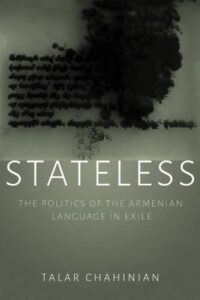Chahinian’s and Şekeryan’s Books Chosen as Der Mugrdechian SAS Outstanding Book Award
Chahinian’s and Şekeryan’s Books Chosen as Der Mugrdechian SAS Outstanding Book Award
The Society for Armenian Studies (SAS) is pleased to announce that Talar Chahinian’s Stateless: The Politics of the Armenian Language in Exile (Syracuse University Press, 2023) and Ari Şekeryan’s The Armenians and the Fall of the Ottoman Empire: After Genocide, 1918–1923 (Cambridge University Press, 2023) have been awarded this year’s Der Mugrdechian SAS Outstanding Book Award. An honorable mention has been awarded to Vartan Matiossian’s The Politics of Naming the Armenian Genocide: Language, History, and ‘Medz Yeghern’ (I.B. Tauris, 2022).
Established in 2015, the Der Mugrdechian SAS Outstanding Book Award accepts nominations for works that advance knowledge and scholarship on Armenian society, culture, and history from ancient times to the present.
Professor Barlow Der Mugrdechian, Director of the Armenian Studies Program at California State University, Fresno and a past President of SAS, has generously offered to sponsor the award for the next five years. The Book Award covered works published in the period of May 1, 2019, to April 30, 2021. Winners will receive a $1,000 monetary award from SAS and a certificate of recognition.
Stateless focuses on two key moments and places of Western Armenian literary history, post-WWI Paris and post-WW II Beirut, to examine how a stateless language sustained itself in a diasporic setting. In it, by analyzing the public debates, critical writings, and the creative works of writers gathered around the journal Menk and writers gathered around the Writers’ Association of Syria and Lebanon (WASL), Chahinian comparatively interrogates competing models of literary production and their intersection with Western Armenian’s prolonged linguistic vitality.

“It’s a great honor to receive this recognition from the SAS, whose community of scholars has helped shape the development of my intellectual trajectory,” said Chahinian. “I congratulate my co-winner, Ari Şekeryan, and the recipient of this year’s honorable mention, Vartan Matiossian, both of whose works inspire me. I’m grateful to the SAS for continuing to expand the comparative, multidisciplinary scope of the field and for encouraging scholarship that reimagines the limits of Armenian studies.”

In The Armenians and the Fall of the Ottoman Empire: After Genocide: 1918-1923, Ari Şekeryan examines the survival of the post-genocide Armenian community during the underexplored Armistice years, drawing on an extensive collection of Armenian and Ottoman Turkish primary sources. Şekeryan outlines the community’s shifting political position and the strategies they employed to endure this turbulent period. By focusing on the Ottoman Armistice, Şekeryan sheds light on an oft-neglected period in history and presents a new case study for understanding the political reactions of ethnic groups to the fall of empires and nation-states.
“I am deeply honored to receive this recognition for my book from the Society of Armenian Studies and the Selection Committee. I extend my heartfelt thanks to Barlow Der Mugrdechian – whose decades of dedicated work in Armenian Studies continue to inspire young scholars – for making this award possible,” said Şekeryan. “I am thrilled to share this award with Talar Chahinian, whose significant research on post-genocide Western Armenian literary history enriches our understanding of this period. My work aimed to explore the survival story of the post-genocide Armenian community during the turbulent Armistice years, amidst political turmoil, violence, and the ambitions of the Great Powers. I am glad to be part of a new generation of scholars building on the work of those who have laid the foundation in Armenian Studies.”

5/4/21 Environmental portraits of UM Postdocs on Ingalls Mall area.
Vartan Matiossian’s The Politics of Naming the Armenian Genocide: Language, History, and ‘Medz Yeghern’ explores the genealogy of the concept of ‘Medz Yeghern’ (‘Great Crime’), drawing upon extensive research based on Armenian sources, neglected in much of the current historiography, as well as other European languages in order to trace the development of the concepts pertaining to mass killing and genocide of Armenians from the ancient to the modern periods. Beginning with an analysis of the term itself, he shows how the politics of its use evolved as Armenians struggled for international recognition of the crime after 1945, in the face of Turkish protest.
“What an honor to chair the selection committee for the SAS Book Award, which was tasked to evaluate such a multidisciplinary and diverse set of submissions traversing national, disciplinary, and linguistic boundaries,” said Shushan Karapetian, director of the USC Institute of Armenian Studies. “This is another testament to the ever-widening scope and impact of Armenian Studies scholarship.”
“It is a pleasure to recognize the excellent scholarship of Talar Chahinian and Ari Şekeryan (co-winners of the Der Mugrdechian SAS Outstanding Book Award) and Vartan Matiossian (honorable mention),” said Christina Maranci, the President of the Society for Armenian Studies (SAS) and the holder of Mashtots Chair in Armenian Studies at Harvard. “We thank all those involved with the selection progress and offer thanks, above all, to Barlow Der Mugrdechian for his generosity in sponsoring this award.”
The SAS is an international body, composed of scholars and students, whose aims are to promote the study of Armenian culture and society, including history, language, literature, and social, political, and economic questions; to facilitate the exchange of scholarly information pertaining to Armenian studies around the world; and to sponsor panels and conferences on Armenian studies.
For membership information or more information on the Society for Armenian Studies, please visit the SAS website or follow SAS on Facebook.







